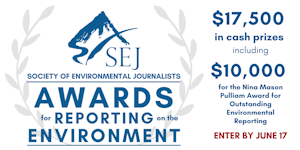SEJournal Online is the digital news magazine of the Society of Environmental Journalists. Learn more about SEJournal Online, including submission, subscription and advertising information.
Senate Republicans are trying to keep the public from knowing who pays the scientists and lobbyists trying to stop the government from protecting workers against a deadly disease.
Would industry pay for studies that downplay or obscure the danger of its products — while hiding its funding to pass them off as legitimate "science"? Yes, they would. Recent history offers numerous examples, such as the tobacco industry's denial that cigarettes cause cancer for decades after documents show they knew perfectly well that it did. Or the chemical industry's campaign to fool the public about the risk of vinyl chloride exposure to workers.
Should the public and other scientists know who paid for a study (and whether they have a financial stake in its findings) in order to evaluate its credibility? Public health advocates usually say yes. But once again industry-funded anti-regulatory politicians are trying to keep the public in the dark. This time it's about silica.
The knowledge that breathing silica dust can cause often-fatal lung disease is centuries old. Extensive science during the 20th century verified it — based on studies of miners and others occupationally exposed. The Occupational Safety and Health Administration (OSHA) adopted exposure limits for crystalline silica in 1971, but those regs are inadequate and out-of-date and OSHA is now revising them.
OSHA put a proposed silica exposure rule out for comment on September 12, 2013. Normally, all kinds of industry, labor, and health groups submit comments on such proposals. Typically, such comments include various scientific claims and references to various scientific studies.
Here's the big news for freedom-of-information watchdogs. For what is believed to be the first time, OSHA's proposed silica rule "requests" that commenters state clearly who paid for any research they cite and declare whether there may be possible conflicts of interest or whether the funder of the research may have influenced its findings. OSHA requests, but does not require, that commenters include such information when submitting their comments to the rulemaking docket.
Typically, most in the research community consider such funding transparency to be a basic ingredient in "scientific integrity." An increasing number of refereed scientific journals require researchers to disclose funding and potential conflicts to journal editors, although fewer require this information to be published. Some background is here, here, and here.
But now, in a dizzying turnabout of standard thinking about scientific integrity, a group of 16 Senate Republicans has complained of OSHA's request for funding disclosure. Leading them was Sen. Lamar Alexander (R-TN), ranking minority member of the Committee on Health, Education, Labor, and Pensions.
In a November 21, 2013, letter to Assistant Secretary of Labor David Michaels, who heads OSHA, the senators said: "Disclosing the funding sources of commenters who submit scientific or technical research raises questions about whether OSHA will use that information to prejudge the substance of those comments and could result in dissuading stakeholders from even submitting comments."
In effect, the GOP senators are arguing that the funding for any research submitted for the record in a regulatory proceeding should always be undisclosed. If an industry group may have changed the findings of the scientific research to suit their economic interests, the senators seem to be arguing, that possibility should be kept secret as well. Moreover, the senators seem to believe that lobbyists and consultants who are paid by industry to submit comments to the record in rulemakings should never reveal who hired them to submit those comments.
OSHA's silica rule is big news in itself, beyond the funding-disclosure story. It could well have huge impact on the fracking industry, which consumes huge quantities of silica "frac sand" in its operations — and will impact the burgeoning sand-mining industry that feeds the fracking industry, not to mention an indirect effect on the communities all that silica is trucked through. The industrial impacts extend to construction, shipbuilding, mining, concrete, foundries, sandblasting, and many other important industries.
There is telltale evidence that the disclosure protest is really just part of a campaign to resist OSHA's silica rule on all fronts. Alexander's November 21 letter doesn't just ask OSHA to drop its disclosure request — it asks OSHA to extend for a second time the comment deadline that OSHA had already extended once. With so much at stake, a few months' stall is worth a lot to industry — a chance to push the rulemaking into the 2014 election season when it will be much more difficult politically.
The senators are courting another delay by asking for appointment of a "Small Business Advocacy Review Panel" on the rule — despite the fact that one was convened in 2003.
What's at stake? Industry could save some money by not tightening protections for the roughly 2.2 million workers exposed to respirable crystalline silica. But OSHA estimates that a tighter rule could save 700 lives a year.
There is a flavor of political jiu-jitsu to the disclosure dispute. The GOP senators did not bother to seek even a token Democrat to sign their letter. They object to the mere request for funding and conflict information. Nothing seemingly prevents industry commenters from just ignoring the request. They argue against the request as if it were a requirement. But if they do not disclose the paid-for science, somebody could point this out, or, worse yet, reveal the funding, embarrassing them and undermining their claims. In writing the letter, they attack disclosure as an attack on their putative right to deceive the public with corrupt science.
But the stakes are also high in the funding-disclosure tussle because it is precedent-setting. OSHA head Michaels has argued in other contexts that disclosure of research funding and potential conflicts should be routine in regulatory science submissions. Could this practice spread to other agencies?
Today, many federal laws and regulations require industries to pay for scientific studies demonstrating whether their products are safe. A decade or two ago, industry-funded science enjoyed the benefit of the doubt — and regulatory agencies and news media were willing to give it. But over the years, industry's record of fiddling with science and twisting the results have cost it credibility.
An example is the American Council on Science and Health (ACSH). The ACSH attacks the science behind federal efforts to protect environmental health and safety, presenting itself as an independent and objective science organization. ACSH has refused to disclose its funding sources for two decades. But, as a recent Mother Jones investigation showed, leaked documents reveal that its funders are the very corporations and industries who profit from weak health and safety regs.
Here is the text of the part of OSHA's proposed silica rule containing the disclosure request:
"If you submit scientific or technical studies or other results of scientific research, OSHA requests (but is not requiring) that you also provide the following information where it is available: (1) Identification of the funding source(s) and sponsoring organization(s) of the research; (2) the extent to which the research findings were reviewed by a potentially affected party prior to publication or submission to the docket, and identification of any such parties; and (3) the nature of any financial relationships (e.g., consulting agreements, expert witness support, or research funding) between investigators who conducted the research and any organization(s) or entities having an interest in the rulemaking. If you are submitting comments or testimony on the Agency's scientific and technical analyses, OSHA requests that you disclose: (1) The nature of any financial relationships you may have with any organization(s) or entities having an interest in the rulemaking; and (2) the extent to which your comments or testimony were reviewed by an interested party prior to its submission. Disclosure of such information is intended to promote transparency and scientific integrity of data and technical information submitted to the record. This request is consistent with Executive Order 13563, issued on January 18, 2011, which instructs agencies to ensure the objectivity of any scientific and technological information used to support their regulatory actions. OSHA emphasizes that all material submitted to the rulemaking record will be considered by the Agency to develop the final rule and supporting analyses."
Here is the part of the 16 GOP senators' letter objecting to OSHA's request:
"We are also very concerned about OSHA's attempt to have commenters disclose their financial backers. Disclosing the funding sources of commenters who submit scientific or technical research raises questions about whether OSHA will use that information to prejudge the substance of those comments and could result in dissuading stakeholders from even submitting comments. The disclosure request raises several other important issues including: what is OSHA's legal authority to request such information; whether a commenter's funding sources will be publicly disclosed; whether the Office of Management and Budget (OMB) approved of OSHA's request; and whether OSHA consulted with any stakeholders before including the request in the proposed rule. Because the proposed rule fails to shed light on any of the above concerns, we call on OSHA to rescind any request for information regarding commenters' funding sources."
- "Proposed Rule: Occupational Exposure to Respirable Crystalline Silica," Occupational Safety and Health Administration, September 12, 2013, pp. 56274-56504, Docket No. OSHA–2010–0034.
- "Alexander, GOP Colleagues Call on Administration to Conduct Proper Assessment of Proposed Rule on Silica Exposure," Senate Committee on Health, Education, Labor, and Pensions, Release of November 21, 2013.
- Letter of November 21, 2013, from Sens. Lamar Alexander and Jim Risch to OSHA Assistant Sec. David Michaels.
- "Request That Silica Commenters Disclose Funding Sparks Debate on Transparency, Bias," BNA Occupational Safety & Health Reporter, October 17, 2013, by Stephen Lee.
- "Leaked Documents Reveal the Secret Finances of a Pro-Industry Science Group," Mother Jones, October 28, 2013, by Andy Kroll and Jeremy Schulman.
- "The Making of an Agribusiness Apologist," Mother Jones, February 24, 2012, by Tom Philpott.
- "Paging Dr. Ross," Mother Jones, November 2005, by Bill Hogan.
- "Fracking Sand May Pose Health Hazard to Workers, Residents," Huffington Post, November 16, 2012, by Lynne Peeples.
- "Starved Rock Area Residents Resistant to Sand Mines," Chicago Tribune, November 24, 2013, by Julie Wernau.
- "Minnesota Town First To Monitor Pollution Caused by Fracking Sand on Passing Trucks," AllGov, November 18, 2013, by Matt Bewig.
- "'Frac Sand' Mining Boom: Health Hazard Feared, but Lawmakers Aim To Ease Regulation," InsideClimate News, November 5, 2013, by Zahra Hirji.
- "Western Wis. School District Works To Keep Silica Sand out of School," Associated Press, November 4, 2013.
- "Tiny Minnesota City Draws a Line in the Frac Sand Boom," InsideClimate News, November 11, 2013, by Zahra Hirji.
- Previous Story: WatchDog of July 17, 2013.












 Advertisement
Advertisement 



